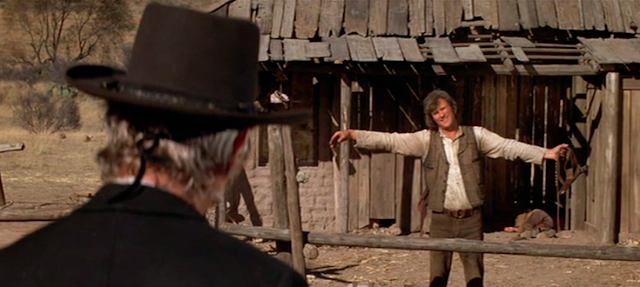 |
| Elliott Gould and Sterling Hayden in The Long Goodbye |
Eileen Wade: Nina van Pallandt
Roger Wade: Sterling Hayden
Marty Augustine: Mark Rydell
Dr. Verringer: Henry Gibson
Harry: David Arkin
Terry Lennox: Jim Bouton
Jo Ann Eggenweiler: Jo Ann Brody
Director: Robert Altman
Screenplay: Leigh Brackett
Based on a novel by Raymond Chandler
Cinematography: Vilmos Zsigmond
Music: John Williams
The Long Goodbye, Robert Altman's loopy take on the myth of the hardboiled private eye, holds up well today, thanks to Elliott Gould's performance as Philip Marlowe. A long way from the world-weary, cynical Marlowes of Humphrey Bogart and Dick Powell, Gould's version of the character is a guy who will go out in the middle of the night to buy food for his cat and will stop dead in the middle of the street for a dog that refuses to get out of the way of his car. Not that he's a softy, exactly. He's not above meting out his own brand of punishment -- a bullet to the gut -- for someone who's eluded the law. It's just that he sees the world as a messed-up place and feels sympathy for its innocents: mainly, cats and dogs. Otherwise, there are few innocents in the circles Marlowe finds himself caught up in. He smokes incessantly, even though no one else around him does, thinking nothing of lighting up -- often from the butt of a previous cigarette -- before he enters someone else's space. He smokes so much that it's surprising he has the wind to chase Eileen Wade's car on foot for several blocks. The plot, as so often in adaptations of Raymond Chandler, doesn't matter so much as the attitudes on display, Marlowe's as well as the various people who are trying to prevent him from uncovering their secrets. Altman indulges himself in his usual overlapping, improvised dialogue, especially in group scenes like the one at the L.A. police station or the ones at which Marlowe is surrounded by gangster Marty Augustine and his henchmen. (One of whom is played by the unbilled and mute but indomitably there Arnold Schwarzenegger.) There are some great set pieces, such as the horrifying scene in which Marty Augustine smashes a Coke bottle in his girlfriend's face, or the attempt of Marlowe and Eileen to rescue Roger from the crashing surf -- with the nice touch that the Wades' Weimaraner fetches Roger's cane from the waves. There's some entertaining filigree around the narrative edges, like the gaggle of nubile starlets who live next door to Marlowe. And there's some offbeat casting that, for once, works: Nina van Pallandt, whose chief claim to fame is that she was hoaxer Clifford Irving's mistress and ratted on him about his fake Howard Hughes autobiography, and Jim Bouton, the ballplayer whose behind-the-scenes book Ball Four tattled on the misbehavior of idols like Mickey Mantle. Leigh Brackett, who collaborated on the screenplay for Bogart's The Big Sleep (Howard Hawks, 1946), is the credited screenwriter, and apparently did shape the plot for Altman, but the dialogue has that off-the-cuff, on-the-set character of most of the director's films. John Williams's title theme, sometimes with lyrics by Johnny Mercer, is wittily deployed throughout the movie, as doorbell chimes or supermarket Muzak, and in various arrangements, including one for the municipal band of the Mexican town of Tepotzlan.
Filmstruck








